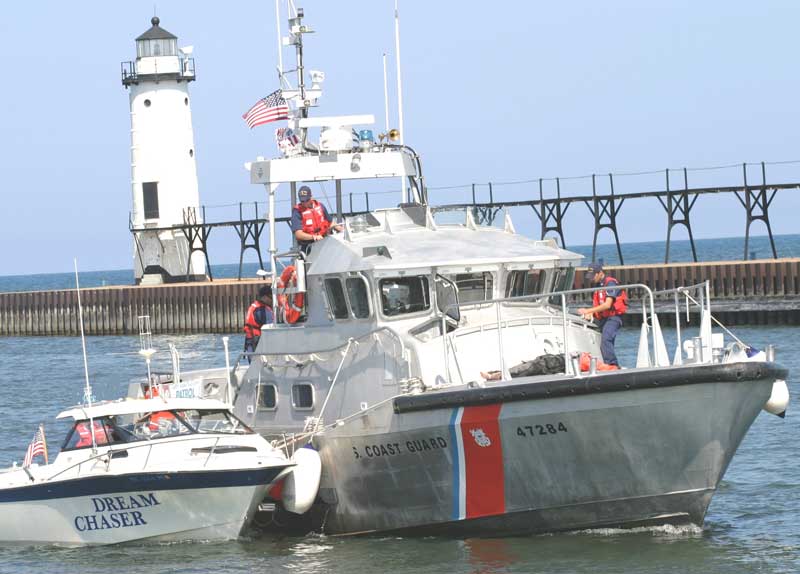|
Coast Guard Great
Lakes Boating Report Troubling
by Tom Rau
I salute the folks at District
Nine headquarters in Cleveland for their fine
tracking system regarding recreational boating
activity across the Great Lakes. Their 2007 report
on recreational boating provides insightful and,
in some cases, troubling figures. For better or
for worse, the report definitely merits review.
 |
| During 2007, Coast Guard crews
across the Great Lakes responded to 4,112
search and rescue cases. Ninety-five percent
of those cases involved recreational water
related activities. Photo, Tom Rau/Boat Smart. |
During 2007 Coast Guard units across the Great
Lakes conducted 4,112 search and rescue cases that
involved 9,108 people with 567 lives saved. The
down side: 115 lives were lost, an alarming
28-percent increase over 2006 fatality figures.
The leading cause of lives lost was drowning,
accounting for 43-percent of deaths; nearly all
could have been prevented with life jacket use;
none involved heavy weather.
Only one percent of Coast Guard cases involved
foul weather. As weather had little to do with
most boating mishaps, so too were boaters
requiring assistance in deep water far from shore.
Of the 4,112 rescues Coast Guard crews conducted
across the Great Lakes, only 17-percent occurred
further than a mile off shore and most of those
were within five miles. So if it’s not weather,
not boaters stranded afar, then why the need for
all these rescues?
According to the figures, the leading cause of
request for Coast Guard assistance is mechanical
breakdowns, followed by boaters’ misjudgment and
inexperience, followed by boaters running aground.
These factors accounted for over 50 percent of
Coast Guard responses.
The primary means of notifying the Coast Guard was
a cellular phone, which accounted for 37-percent
of calls, with the marine radio second at
29-percent. Although apparently effective, the
cellular phone simply does not offer the
life-saving advantages of a marine radio.
The marine radio is monitored not only by the
Coast Guard, but other recreational boaters, and
commercial vessels; it offers radio directional
finding capabilities, allowing Coast Guard radio
receivers to home in on a distressed vessel; and
it is not subject to dead zones that cellular
phones experience. The cell phone is an excellent
backup to the marine radio but by no means a
worthy replacement.
Power boats accounted for 50-percent of rescue
cases, followed by sailboats at 14 percent, then
by personal watercraft at 11 percent. In all,
recreational boaters accounted for 94 percent of
rescue calls.
The huge disparity between commercial vessels
requiring so little assistance and recreational
boaters requiring so much has a great deal to do
with federal mandates that govern the commercial
fleet. Federal laws mandate that the commercial
fleet be boat smart. On the other hand, the only
skills that are required of recreational boaters
is the ability to turn an ignition key, hoist a
sail, or dip a paddle. This cavalier approach has
cost the lives of over 47,000 recreational boaters
since 1964 when the Coast Guard began tracking
recreational boating fatalities.
These askew figures can be balanced if boaters are
required to boat smart. Mandatory education should
apply to all boaters regardless of age and date of
birth as some states have wiggled into law. I
believe the best case for mandatory education
hails from adult boaters who have taken a boating
safety course. A common response from these folks
is how naive they were regarding boating safety
and their welfare on the water.
Another strong case for mandatory boating
education is my book, Boat Smart Chronicles, Lake
Michigan Devours Its Wounded. The book is based on
over 20 years of documented Coast Guard rescues
involving recreational boaters with valuable
lessons learned. The book’s many cases reveal just
how naive boaters can be when it comes to their
safety.
Better to learn these lessons on shore than
afloat, as one young lad proclaimed. Asked by Jim
Shepard, instructor for the United States Power
Squadron, why he took the course, the lad
responded: “Because I read Boat Smart Chronicles,
and it scared the heck out of me.”
Go to www.boatsmart.net and link to boating safety
courses offered by the Coast Guard Auxiliary and
United States Power Squadron. Be smart this
winter, learn to boat smart.
Tom Rau is a long-time Coast
Guard rescue responder and syndicated boating
safety columnist. Look for his book, Boat Smart
Chronicles, a shocking expose on recreational
boating — reads like a great ship’s
log spanning over two decades. It’s available
to order at: www.boatsmart.net,
www.seaworthy.com,
www.amazon.com,
or through local bookstores.
TOP
|